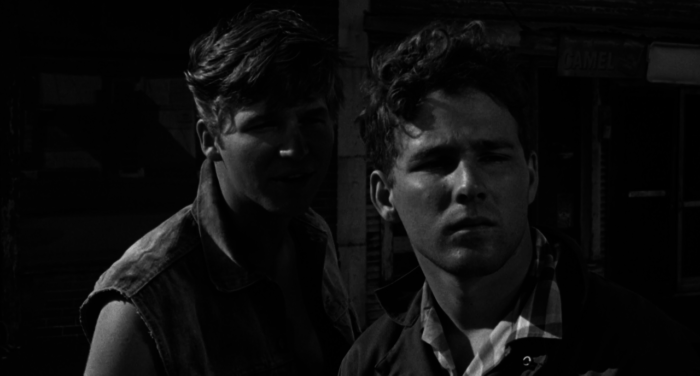
The Last Picture Show is yet another coming of age story that’s really distant from my life experience. It’s set during the Fifties in a small (and shrinking) town somewhere in Texas oil country, where optimism seems to have already died long ago. This is a place where no one has career prospects and the adults entertain themselves by watching to terrible high school basketball team and sleeping with each other. For the kids, the entertainment options have dwindled to the property of one man, Sam the Lion (Ben Johnson), who has a cafe, a pool hall, an the movie theater, from which the title of the film comes.
This is the story of a year in the life of high school seniors as they make their way into adulthood. Our focal point is Sonny (Timothy Bottoms), a young man who has a crush on the prettiest girl in town, Jacy (Cybill Shepherd), who is dating his best friend, Duane (Jeff Bridges). Outside of giving us a marker for their ages, school isn’t really a part of the film, we only see one scene in an actual classroom and it depicts an exasperated teacher trying to talk about poetry with students who just don’t get it because of Jesus.
This is a story of sexual awakening, and how disastrous that can be on a group of horny, immature people. Early on, Sonny breaks up with his girlfriend because she won’t sleep with him on their one year anniversary (which he was oblivious to). Later, Sonny is asked to take the coach’s wife, Ruth (Cloris Leachman), on an errand, and soon begins having an affair with her. Soon, everyone in town knows, but it’s not really a big deal, especially since Sonny’s parents to seem to be in the picture.
Meanwhile, Jacy has been getting pressured by her mom (Ellen Burstyn) to break up with Duane and keep her plan of going to college. At a Christmas event, Jacy ends up bailing on Duane and going with Randy Quaid to an indoor skinny dipping party, where she develops a crush on another local boy. He turns her down for being a virgin, but tells her to come back once she’s had sex. Feeling pressure from both her mother and her crush, Jacy begins to put the moves on Duane.
As for Duane, he just seems befuddled. He knows he likes Jacy, but otherwise seems to embody the directionless quality of his hometown. Sonny has his affair and Jacy her sexual conquests, but Duane seems to just be along for the ride. When Jacy tries to sleep with him, he can’t get it up. They try again and are successful, and soon after Jacy dumps Duane over the phone, leaving him confused and angry. What does he do now?
This is as bleak a portrayal of Texas as I’ve ever seen. Shot in black and white, The Last Picture Show opens on a shot of desolate streets and dust blowing in a harsh wind. It’s cold and unpleasant and perhaps even inhospitable. This town was a place sustained by community, and now that there’s hardly anyone left, it’s effectively a living ghost town. I’m reminded of, coincidentally, Jeff Bridge’s character’s monologue from Hell or High Water about towns that just couldn’t make it.
No doubt about it, this is a depressing movie to watch, with as devastating an ending as I’ve watched this month. But this film isn’t so much about the ending or even it’s story as it is putting you into this place that’s been ravaged by time. Maybe, just maybe, the population boom we’ve been living through in Seattle isn’t literally the worst thing. I can think of at least one less desirable alternative.


